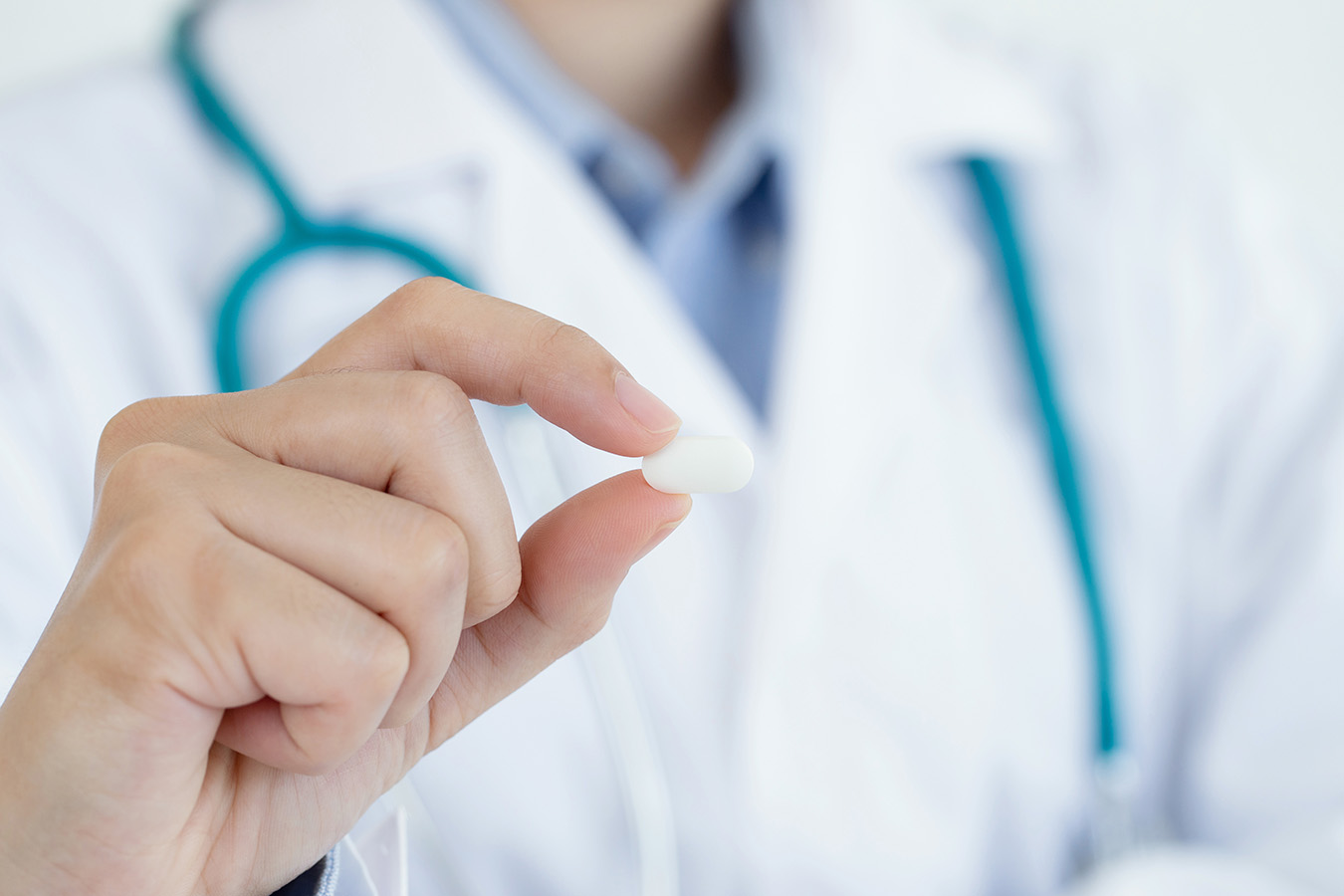A COVID-19 Pill? Here’s What’s in the Works

COVID-19 vaccines seem to get all the attention, but finding oral, at-home treatments for the dangerous novel coronavirus is a promising field for infectious disease researchers. An effective pill could help on many fronts, especially in the case of a vaccine-resistant variant.
“If we can limit the numbers of people coming to the hospital and also limit deaths, it will be a big, big help,” says Folusakin Ayoade, M.D., an infectious disease expert with the University of Miami Health System. For some, namely the vaccine-hesitant, an oral antiviral “may also be more acceptable.”
In fact, a pill to treat COVID-19 — much as Tamiflu shortens the symptoms of the flu — could be “a game-changer,” Dr. Ayoade says.
True, the U.S. Food and Drug Administration has approved some COVID treatments, but most of these lack the ease-of-use physicians and patients prefer. They also suffer from certain limitations, namely that they must be administered intravenously and therefore require a clinical setting.
Currently, the only approved antiviral for COVID-19 in the United States is remdesivir.
Physicians also have access to monoclonal antibodies, but like remdesivir, they must be given intravenously. What’s more, real-life evidence of the efficacy has been mixed.
“It takes a lot of motivation for someone to go to the hospital and spend hours in the ER,” Dr. Ayoade says. Hospital phobia in the setting of the COVID pandemic has kept a lot of people away until their disease was severe or critical. Even now, the patient may wait too long to get the essential treatment, thus missing a narrow window to fight the infection. Yet, with COVID, as with the flu, early antiviral therapy could make a significant difference. This is why scientists continue to pursue the possibility of at-home oral treatment for coronavirus.
Dr. Ayoade leads a team that is actively recruiting volunteers to take part in two different trials of a Pfizer drug that has shown promise in early-stage experiments. One trial will involve testing how well the pill can fight off COVID-19 in people with a family member who has tested positive for the virus. Participants will get either a placebo or the drug, twice a day for five to 10 days, and it will be combined with a low dose of ritonavir, which is now used as a combination treatment for HIV.
The same drug is also being tested in those already infected with COVID. Trial participants must be symptomatic but at the early stage of the infection, and they must be considered low-risk.
The Pfizer drug is a protease inhibitor and works by obstructing the production of enzymes the virus needs to multiply in human cells. It can be prescribed without the need for hospitalization. In a recent Pfizer press release reported by the Associated Press, the same experimental antiviral pill in high-risk adults cut rates of hospitalization and death related to COVID-19 by nearly 90%.
As of this writing, another antiviral is awaiting an FDA nod.
Molnupiravir, developed initially to treat influenza, was so effective in a phase 3 trial with COVID patients that Merck and Ridgeback Biotherapeutics immediately applied for emergency approval. In the United Kingdom, where it was recently approved, it is intended for patients with mild to moderate COVID symptoms with at least one risk factor for developing severe illness. (Risk factors include heart disease, diabetes, and obesity.)
The FDA Molnupiravir decision seems likely to come in the coming weeks, and several countries, including the U.S., have already ordered supplies. Unlike the Pfizer experimental pill, Molnupiravir is a nucleoside analogue. It introduces errors into the genetic code of the COVID coronavirus that causes COVID-19, thus slowing replication.
Treating a virus can be particularly tricky. Unlike bacteria, which have internal mechanisms to reproduce, viruses must incorporate into the host DNA to multiply. Viruses also mutate quickly, which tends to reduce the effectiveness of an antiviral drug over time.
“Most antiviral agents don’t kill the virus,” Dr. Ayoade says. “They minimize the virus replication.”
Yet, Dr. Ayoade says this sleight of hand has been done successfully. Antivirals have been developed to treat such life-threatening diseases as Ebola, hepatitis, HIV, and other coronaviruses. They do this by boosting the immune system, or lowering the viral load, or blocking the virus from entering and binding to healthy cells.
Other drug agents are being tested as COVID treatments, but many are in the very early stages. In the case of the Pfizer drug, he is hopeful “it might stop the virus early before it can continue replicating.”
For more information or to volunteer for one of his Pfizer drug trials, contact Kenia Moreno or Abel Bicet.
Ana Veciana-Suarez, Guest Columnist

Ana is a regular contributor to the University of Miami Health System. She is a renowned journalist and author who has worked at The Miami Herald, The Miami News, and The Palm Beach Post. Visit her website at anavecianasuarez.com or follow @AnaVeciana on Twitter.
Tags: COVID treatments, COVID vaccines, covid-19 in Miami, Dr. Folusakin Ayoade, pandemic
